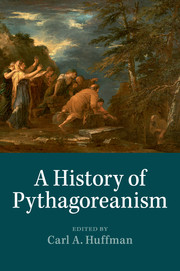Book contents
- Frontmatter
- Contents
- Contributors
- Abbreviations
- Introduction
- Chapter 1 Pythagoras
- Chapter 2 Philolaus
- Chapter 3 Archytas
- Chapter 4 Sixth-, fifth- and fourth-century Pythagoreans
- Chapter 5 The Pythagorean society and politics
- Chapter 6 The Pythagorean way of life and Pythagorean ethics
- Chapter 7 Pythagoreans, Orphism and Greek religion
- Chapter 8 The problem of Pythagorean mathematics
- Chapter 9 Pythagorean harmonics
- Chapter 10 The Pythagoreans and Plato
- Chapter 11 Aristotle on the “so-called Pythagoreans”: from lore to principles
- Chapter 12 Pythagoreanism in the Academic tradition: the Early Academy to Numenius
- Chapter 13 The Peripatetics on the Pythagoreans
- Chapter 14 Pythagoras in the historical tradition: from Herodotus to Diodorus Siculus
- Chapter 15 The pseudo-Pythagorean writings
- Chapter 16 Pythagoreans in Rome and Asia Minor around the turn of the common era
- Chapter 17 Diogenes Laertius’ Life of Pythagoras
- Chapter 18 Porphyry's Life of Pythagoras
- Chapter 19 Iamblichus’ On the Pythagorean Life in context
- Chapter 20 Pythagoras and Pythagoreanism in late antiquity and the Middle Ages
- Chapter 21 Pythagoras in the Early Renaissance
- Bibliography
- General index
- Index locorum
- Greek index
Chapter 4 - Sixth-, fifth- and fourth-century Pythagoreans
Published online by Cambridge University Press: 05 May 2014
- Frontmatter
- Contents
- Contributors
- Abbreviations
- Introduction
- Chapter 1 Pythagoras
- Chapter 2 Philolaus
- Chapter 3 Archytas
- Chapter 4 Sixth-, fifth- and fourth-century Pythagoreans
- Chapter 5 The Pythagorean society and politics
- Chapter 6 The Pythagorean way of life and Pythagorean ethics
- Chapter 7 Pythagoreans, Orphism and Greek religion
- Chapter 8 The problem of Pythagorean mathematics
- Chapter 9 Pythagorean harmonics
- Chapter 10 The Pythagoreans and Plato
- Chapter 11 Aristotle on the “so-called Pythagoreans”: from lore to principles
- Chapter 12 Pythagoreanism in the Academic tradition: the Early Academy to Numenius
- Chapter 13 The Peripatetics on the Pythagoreans
- Chapter 14 Pythagoras in the historical tradition: from Herodotus to Diodorus Siculus
- Chapter 15 The pseudo-Pythagorean writings
- Chapter 16 Pythagoreans in Rome and Asia Minor around the turn of the common era
- Chapter 17 Diogenes Laertius’ Life of Pythagoras
- Chapter 18 Porphyry's Life of Pythagoras
- Chapter 19 Iamblichus’ On the Pythagorean Life in context
- Chapter 20 Pythagoras and Pythagoreanism in late antiquity and the Middle Ages
- Chapter 21 Pythagoras in the Early Renaissance
- Bibliography
- General index
- Index locorum
- Greek index
Summary
What does it mean to be a Pythagorean in the sixth to fourth centuries bc?
Not every Presocratic philosopher had students, but many of them had at least one: Anaximander was reported to be Thales’ student; Anaximenes probably was a student of Anaximander. Several thinkers, such as Parmenides of Elea and Leucippus of Abdera, founded philosophical schools, though in each case only one of their immediate students is known: Zeno of Elea and Democritus of Abdera. We hear also about Heracliteans and Anaxagoreans, some of whom are known by name. Cratylus of Athens interpreted Heraclitus’ book but was not his personal student. Archelaus and Metrodorus belonged to Anaxagoras’ circle in Athens and Lampsacus, respectively. As is often the case, Pythagoras exceeds all the other Presocratics both in the number of his followers and in the continuity of his school. Indeed, Pythagoreanism was the only strain of Presocratic thought to survive, albeit in much-modified form, until the end of antiquity. Even if we limit ourselves to ancient Pythagoreanism, which came to an end around the mid fourth century BC, we still have almost 200 years of its existence and more than 200 names of Pythagoreans.
If we try to uncover the reasons for Pythagoras’ extraordinary success, the results are unexpected. The Pythagoreans were not (or at least not originally) organized in a philosophical school, if we understand by this “an identifiable group committed to the teaching and manner of life prescribed by the founder” (Mason 1996: 31). Unlike Plato, Epicurus or Zeno of Citium, Pythagoras founded not an institutionalized philosophical school with a range of well-defined doctrines, varied though these might be at different times, but a political society (ἑταιρεία). Besides, his teachings were not set down in writing and his followers were widely scattered in many cities of Magna Graecia and, after the mid fifth century BC, of mainland Greece as well. Most Pythagoreans were not philosophers, and those who were – Alcmaeon, Hippasus, Hippon, Philolaus, Archytas, Ecphantus and others – did not teach Pythagoras’ philosophy but their own theories. Similar in some respects, they were different in many others; no school doctrine shared by all or even most Pythagorean philosophers is known.
Keywords
- Type
- Chapter
- Information
- A History of Pythagoreanism , pp. 88 - 111Publisher: Cambridge University PressPrint publication year: 2014
- 6
- Cited by



